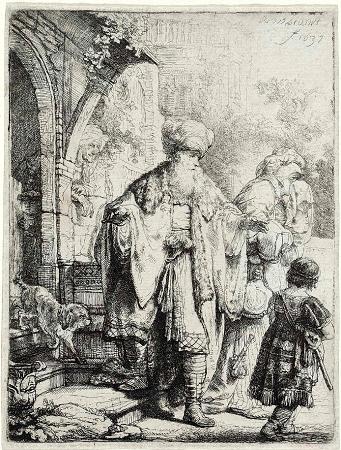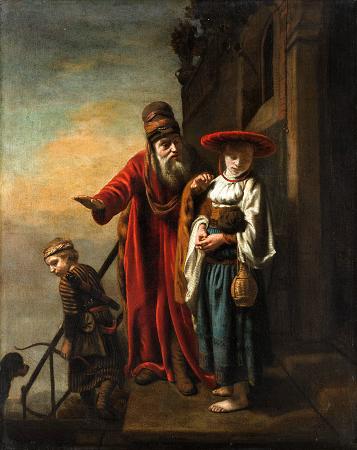Hagar. Hagar is a biblical person in the Book of Genesis. She was an Egyptian slave / handmaid of Sarai, who gave her to Abraham to bear a child. The product of the union was Abraham's firstborn, Ishmael, the progenitor of the Ishmaelites. Various commentators have connected her to the Hagrites, perhaps as their eponymous ancestor. The name Hagar originates from the Book of Genesis; she is acknowledged in all Abrahamic religions. Hagar is alluded to in the Quran, and Islam considers her Abraham's second wife. This is a summary of the account of Hagar from Genesis 16 and 21. Hagar was the Egyptian slave of Sarah, Abraham's wife. Sarah had been barren for a long time and sought a way to fulfill God's promise to Abraham that Abraham would be father of many nations, especially since they were getting older, so she offered Hagar to Abraham as a second wife. Hagar became pregnant, and tension arose between the two women. Sarah complained to Abraham, and treated Hagar harshly, and Hagar ran away. Hagar fled into the desert on her way to Shur. At a spring en route, an angel appeared to Hagar, who instructed her to return to Sarah, so that she may bear a child who shall be a wild ass of a man: his hand shall be against every man, and every man's hand against him; and he shall dwell in the face of all his brethren. Then she was told to call her son Ishmael. Afterward, Hagar referred to God as El Roi. She then returned to Abraham and Sarah, and soon gave birth to a son, whom she named as the angel had instructed. Later, Sarah gave birth to Isaac, and the tension between the women returned. At a celebration after Isaac was weaned, Sarah found the teenage Ishmael mocking her son. She was so upset by it that she demanded that Abraham send Hagar and her son away. She declared that Ishmael would not share in Isaac's inheritance. Abraham was greatly distressed but God told Abraham to do as his wife commanded because God's promise would be carried out through Isaac; Ishmael would be made into a great nation as well because he was Abraham's offspring. Early the next morning, Abraham brought Hagar and Ishmael out together. Abraham gave Hagar bread and water then sent them into the wilderness of Beersheba. She and her son wandered aimlessly until their water was completely consumed. In a moment of despair, she burst into tears. God heard her and her son crying and came to rescue them. The angel opened Hagar's eyes and she saw a well of water. He also told Hagar that God would make a great nation of Ishmael. Hagar found her son a wife from Egypt and they settled in the Desert of Paran. According to the Baha'i Faith, the Bab was a descendant of Abraham and Hagar, and God made a promise to spread Abraham's seed. The Baha'i Publishing House released a text on the wives and concubines of Abraham and traces their lineage to five different religions. In the New Testament, Paul the Apostle made Hagar's experience an allegory of the difference between law and grace in his Epistle to the Galatians chapter 4. Paul links the laws of the Torah, given on Mount Sinai, to the bondage of the Israelite people, implying that it was signified by Hagar's condition as a bondswoman, while the free heavenly Jerusalem is signified by Sarah and her child. The Biblical Mount Sinai has been referred to as Agar, possibly named after Hagar. Augustine of Hippo referred to Hagar as symbolizing an earthly city, or sinful condition of humanity: In the earthly city. we find two things, its own obvious presence and the symbolic presence of the heavenly city. New citizens are begotten to the earthly city by nature vitiated by sin but to the heavenly city by grace freeing nature from sin. This view was expounded on by medieval theologians such as Thomas Aquinas and John Wycliffe. The latter compared the children of Sarah to the redeemed, and those of Hagar to the unredeemed, who are carnal by nature and mere exiles. The story of Hagar demonstrates that survival is possible even under harshest conditions. Although not mentioned by name in the Qur'an, she is referenced and alluded to via the story of her husband.
more...













